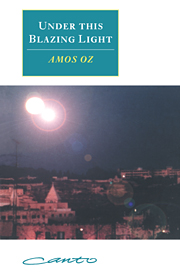Book contents
- Frontmatter
- Contents
- Translator's note
- Preface to the Hebrew edition
- Introduction
- Events and books
- Under this blazing light
- ‘Man is the sum total of all the sin and fire pent up in his bones’
- ‘A ridiculous miracle hanging over our heads’
- The State as reprisal
- A modest attempt to set out a theory
- The meaning of homeland
- The discreet charm of Zionism
- A.D. Gordon today
- Thoughts on the kibbutz
- The kibbutz at the present time
- How to be a socialist
- Munia Mandel's secret language
- Pinchas Lavon
- The lost garden
- An autobiographical note
- An alien city
- Like a gangster on the night of the long knives, but somewhat in a dream
- Notes
- Publication history
- Index of names
The discreet charm of Zionism
Published online by Cambridge University Press: 07 September 2010
- Frontmatter
- Contents
- Translator's note
- Preface to the Hebrew edition
- Introduction
- Events and books
- Under this blazing light
- ‘Man is the sum total of all the sin and fire pent up in his bones’
- ‘A ridiculous miracle hanging over our heads’
- The State as reprisal
- A modest attempt to set out a theory
- The meaning of homeland
- The discreet charm of Zionism
- A.D. Gordon today
- Thoughts on the kibbutz
- The kibbutz at the present time
- How to be a socialist
- Munia Mandel's secret language
- Pinchas Lavon
- The lost garden
- An autobiographical note
- An alien city
- Like a gangster on the night of the long knives, but somewhat in a dream
- Notes
- Publication history
- Index of names
Summary
Yes, there is a growing despondency, and lately people have stopped feeling ashamed of it and hiding it behind the usual mask of cheerful complacency. I myself share this despondency. I even felt it in the years between 1967 and 1973, when most people seemed to be living in a state of uninterrupted euphoria. But recently, specifically since the Yom Kippur War, I have had an intuitive feeling that deep down at least some of the pain is a symptom of recovery. I am less frightened now than I was, let us say, in 1969 or 1970.
Look, for the past three years, since the Yom Kippur War, this peculiar people has been tormenting itself with the question ‘What did we do wrong?’, on all sorts of levels, ranging from those who keep harping on the memory of our emergency arsenals, which were so badly neglected, to those who are preoccupied with the question of the historical, theological, symbolic, and metaphysical meaning of what happened to us. Other peoples do not keep picking at their sores so obsessively, so masochistically. Naturally, writers and thinkers and moralists of all kinds everywhere engage in soul-searching. But here everybody torments himself, with hardly an exception.
And after all, from what you could call the military point of view we were not defeated in the Yom Kippur War. On the contrary, we won a great victory. We recovered from a sudden invasion by armies not far off the total strength of the combined NATO forces, and in a few days we went from a position comparable to Dunkirk to a situation similar to that of the Allied landings in Normandy, on two separate fronts, and it is well known that our subsequent advance was halted not by exhaustion but by outside pressure.
- Type
- Chapter
- Information
- Under this Blazing Light , pp. 103 - 112Publisher: Cambridge University PressPrint publication year: 1995



